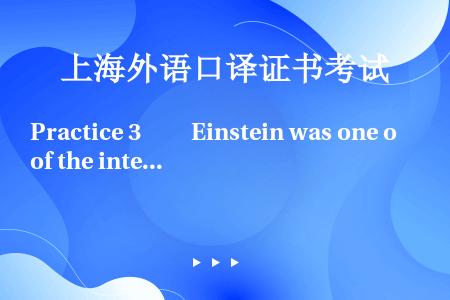 问答题
问答题
Practice 3 Einstein was one of the intellectual heroes of history, and such heroes, like Newton and like Darwin, are always twofold — rebels in their work and heretics in society. He prized the integrity of man's personality more highly than man's science. Back in the 1920's he said, in some desultory interview, that two discoveries might destroy mankind: atomic energy and universal thought-reading. The wry prophecy sums up Einstein's passions. He saw deeply into nature, her promise and her threat, but he was not too abstracted to remember .the fallibility of men. For him the key to the world lay in the minds of men. He fought for freedom of the mind from his rebellious school-days and the manifesto of 1914 to his dying day. In his last years he spoke out constantly against the inquisition which then darkened America. But even his love for science and for freedom was not abstract. These were for him the high places of the human mind, and he lived those; he loved people. His richness of sympathy made him a symbol to an age. It carried his ideas beyond their scientific setting so that, more profoundly than the work of any philosopher, they changed the outlook of philosophy. All his ideas grew from one conception: that the world is not given to us absolutely, but is something which we actively observe and thereby shape. For Einstein was a practical thinker; to him, truth was that which is experienced in action. When he died, on April 18, 1955, Einstein had created a new empiricism, as revolutionary and as lasting as that with which Galileo laid the foundation of science.
发布日期:2022-07-20


题王网让考试变得更简单
扫码关注题王,更多免费功能准备上线!

此试题出现在
其他考试
反映疾病频度的指标是()
什么是顺铣?
脊髓前角受压可出现()
在Power Point里,怎样确保绘制的直线一定水平或垂直。()
适用Gamma值较大的期权对冲Delta风险时,不需要经常调整对冲比例。
短时大电流情况下的大地电阻叫做()接地电阻。
(2010)根据《行政许可法》的规定,下列可以不设行政许可事项的是:()
人类行为的变化既受到人们自身改变的影响,也受到社会生活条件改变的影响。这反映了人类行为的()特征。
患儿男,8个月。1天前突然发热,咳嗽,随后呕吐3次,大便稀,每天10余次,呈黄色水样,黏液少,无腥臭味。体检:体温39℃,精神萎靡,皮肤弹性略差,前囟及眼窝凹陷,哭泪少,咽稍充血,心肺检查无异常。大便有少量脂肪球。对该患儿的饮食护理,正确的是()
布告:棉布( )
2021年下半年上海市翻译专业资格(水平)考试安排通知
上海外语口译证书考考试时间分别是什么时候?
上海外语口译证书考试各省市有哪些考点?
上海外语口译证书考试的口试报名是什么时候?怎么报名?
上海外语口译考试:英语口译基础能力考试(口试+笔试)注意事项有哪些?
上海外语口译证书考试怎么查询成绩?
上海外语口译证书考试报名是什么时候?
2021年秋季上海外语口译证书考试时间是什么时候?报名注意事项有什么?
Practice 3 Einstein was one of the intellectual heroes of history, and such her...
Practice 4 Some critics believe that the very concept of intellectual property ...
____
Which of the following statements concerning intellectual property is wrong?()
You need to design a method to ensure that research intellectual property remain...
If a university is to be of any use, it should prepare the students for an intel...
根据本课程,在台湾“Intellectual property”被翻译成()。
“知识产权”这一概念是从西方传来的,英文为Intellectual Property,意为()
For Einstein to become a modern icon, especially in America, required a total re...
Each time Einstein gave the lecture, his driver ______ sat in the front row and ...

